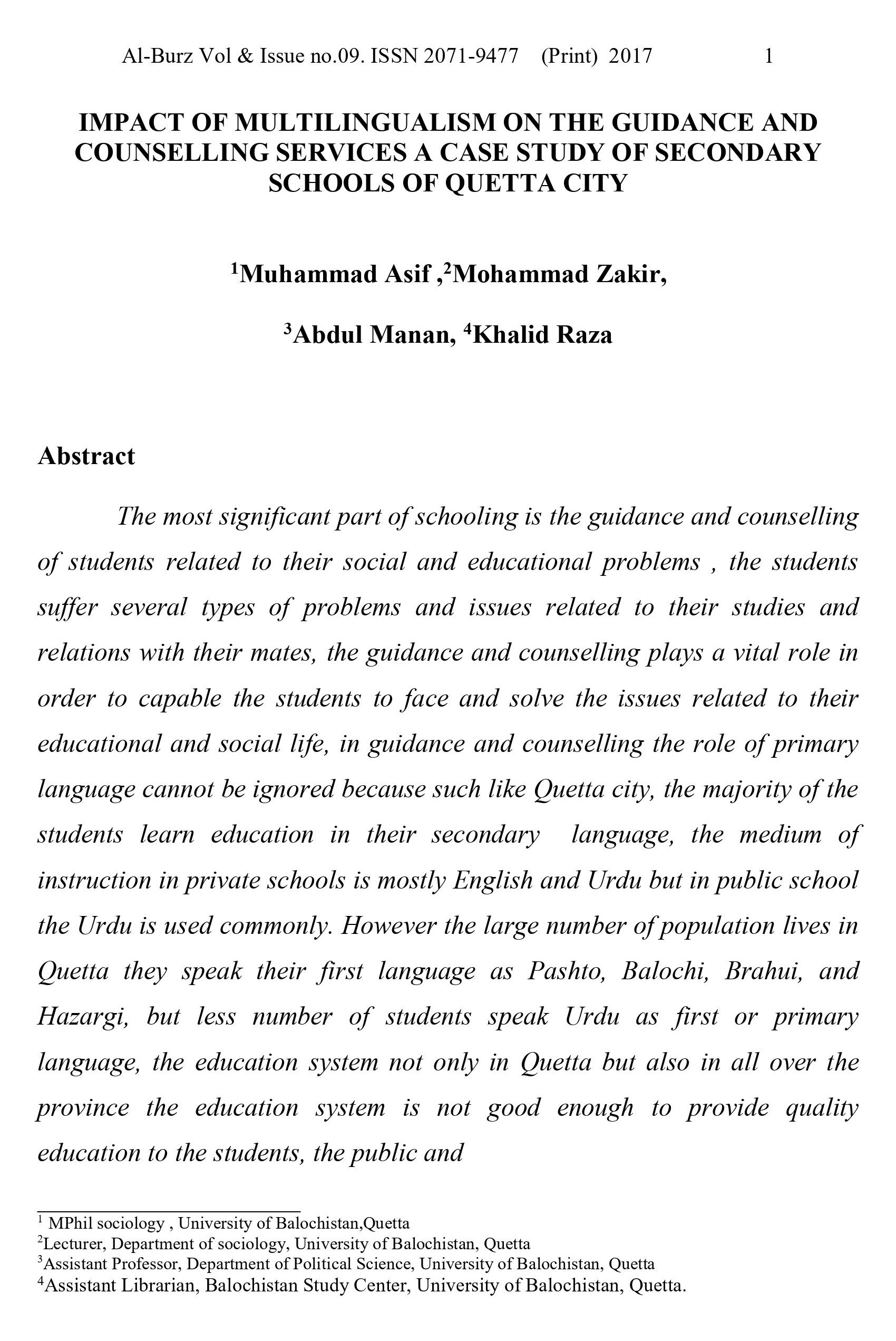IMPACT OF MULTILINGUALISM ON THE GUIDANCE AND COUNSELLING SERVICES A CASE STUDY OF SECONDARY SCHOOLS OF QUETTA CITY
DOI:
https://doi.org/10.54781/abz.v9i1.100Keywords:
Guidance and counselling, Multilingualism, Mod of Instruction.Abstract
The most significant part of schooling is the guidance and counselling of students related to their social and educational problems , the students suffer several types of problems and issues related to their studies and relations with their mates, the guidance and counselling plays a vital role in order to capable the students to face and solve the issues related to their educational and social life, in guidance and counselling the role of primary language cannot be ignored because such like Quetta city, the majority of the students learn education in their secondary language, the medium of instruction in private schools is mostly English and Urdu but in public school the Urdu is used commonly. However, the large number of population lives in Quetta they speak their first language as Pashto, Balochi, Brahui, and Hazargi, but less number of students speak Urdu as first or primary language, the education system not only in Quetta but also in all over the province the education system is not good enough to provide quality education to the students, the public and
References
Dearden, J. (2014). English as a medium of instruction-a growing global phenomenon. British Council.
Haque, A. R. (1982). The position and status of English in Pakistan. World Englishes, 2(1), 6-9.
Shamim, F. (2011). English as the language for development in Pakistan: Issues, challenges and possible solutions. Dreams and realities: Developing countries and the English language, 291-310.
Ghayur, S., &Burki, A. A. (1992). Combating Unemployment in Pakistan [with Comments]. The Pakistan Development Review, 31(4), 1255-1266.
Hathaway, R. M. (2005). Education Reform in Pakistan: Building for the Future. Woodrow Wilson International Center for Scholars. One Woodrow Wilson Plaza, 1300 Pennsylvania Avenue NW, Washington, DC 20004-3027.
Gupta, A. F. (1997). When mother-tongue education is not preferred. Journal of Multilingual and Multicultural Development, 18(6), 496-506.
Bamgbose, A. (1984). Mother-tongue medium and scholastic attainment in Nigeria. Prospects, 14(1), 87-93.
Bamgbose, A. (1976). Mother Tongue Education: The West African Experience.
Knox, A. (1992). Influences on career choice: the responses of ethnic-minority and ethnic-majority girls. British Journal of Guidance & Counselling, 20(2), 193-204.
Siann, G., Knox, A., Thornley, E., & Evans, R. (1990). Parents, careers and culture: the view of ethnic-minority and ethnic-majority girls. British Journal of Guidance & Counselling, 18(2), 156-169.
Falaye, F. W., & Adams, B. T. (2008). An assessment of factors influencing career decisions of in-school youths. Pakistan Journal of social sciences, 5(3), 222-225.
Hue, M. T. (2010). The challenges of making school guidance culturally responsive: Narratives of pastoral needs of ethnic minority students in Hong Kong secondary schools. Educational Studies, 36(4), 357-369.
Soliman, A. M. (1991). The role of counseling in developing countries. International Journal for the Advancement of Counselling, 14(1), 3-14.

Downloads
Published
How to Cite
Issue
Section
License
Copyright (c) 2017 Authors who publish with Al-Burz journal agree to the following terms: 1. Authors retain copyright and grant the journal right of first publication with the work simultaneously licensed under a Creative Commons Attribution (CC-BY) License that allows others to share the work with an acknowledgement of the work's authorship and initial publication in this journal. 2. Authors are able to enter into separate, additional contractual arrangements for the nonexclusive distribution of the journal's published version of the work (e.g., post it to an institutional repository or publish it in a book), with an acknowledgement of its initial publication in this journal.

This work is licensed under a Creative Commons Attribution-NonCommercial-ShareAlike 4.0 International License.
Alburz has licensed under a CC Attribution-NonCommercial-ShareAlike 4.0



